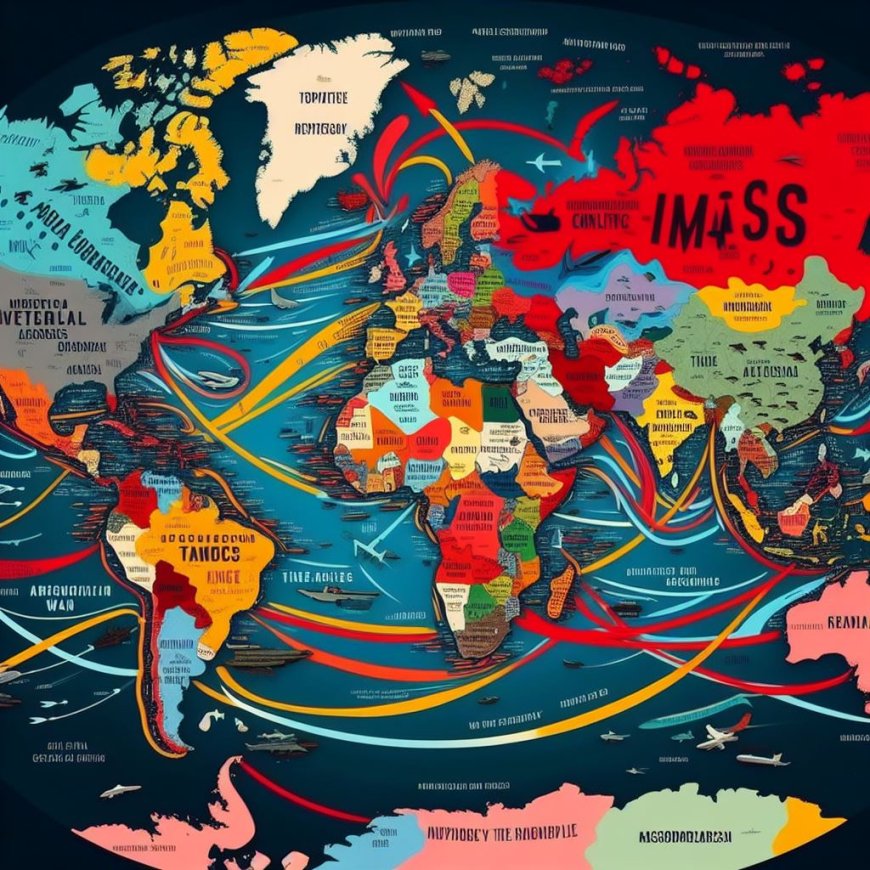
Geopolitics is the study of the complex interactions among geographical, political, economic, and military factors in determining the dynamics of power and international relations at the global level. Some key points about geopolitics include:
1. Geography as a Primary Driver: The geographical position of a country, such as its location, topography, and access to natural resources, can influence its strength and influence in global politics.
2. Power Shifts and Territorial Changes: Geopolitics involves analyzing how power shifts can affect territorial boundaries, political changes, and regional or global dynamics.
3. National Security: Geopolitics considers national security strategies, including military defense, alliances, and foreign policies based on threats and national interests.
4. International Conflict and Cooperation: This study includes the analysis of conflicts and cooperation between nations, including diplomatic roles, negotiations, and conflict resolutions in international relations.
5. Natural Resources and Economy: Control over natural resources and a country's economic influence are crucial factors in geopolitics, affecting bargaining power and global economic stability.
6. Technological Influence: Technological advancements, especially in military and communication fields, can significantly impact a country's power and geopolitical strategies.
7. Roles of Major and Regional Powers: Major powers often take center stage in geopolitics due to their global influence, while regional powers may play crucial roles in shaping dynamics in their respective regions.
8. Dynamics of Social and Political Change: Factors such as internal political changes, demographics, and social shifts are also part of geopolitical analysis, as they can shape stability or instability in a country.
Geopolitics provides a deep understanding of how these factors interact to shape the policies and actions of a country on the international stage.
Civilization refers to a complex, organized, and evolving form of societal life, marked by cultural, social, economic, and political advancements. Some crucial aspects related to the concept of civilization include:
1. Culture and Arts: Civilization encompasses expressions of art, literature, music, and other cultural aspects reflecting the identity and creativity of a society.
2. Social System and Community Structure: Social structure, value systems, norms, and hierarchy within a society are integral parts of civilization.
3. Technological Progress: Civilizations are often identified by their level of technological advancement. Innovations in technology play a vital role in the development of civilization.
4. Economic Organization: The economic system and how a society manages economic resources, trade, and production reflect the level of civilization.
5. Religion and Beliefs: Religion and belief systems often form a significant part of civilization, influencing values, ethics, and social practices.
6. Governance and Political Systems: How a society is politically organized, including the type of government and political systems, reflects an aspect of civilization.
7. Education and Knowledge: Civilization includes progress in education and knowledge, encompassing scientific developments, literacy, and formal education.
8. Population Growth and Urbanization: Changes in population growth and the shift to urban living are indicators of the development of civilization.
9. Inter-Civilization Relations: Interaction between civilizations, including trade, diplomacy, and cultural exchanges, can shape global and regional dynamics.
10. History and National Identity: Civilization involves a historical legacy that shapes the national identity of a society.
Each civilization has its distinctive characteristics, and human history is marked by the diversity of civilizations that have emerged and disappeared over time. The study of civilizations helps us understand the complexity and evolution of human societies across various dimensions of their lives.
Geopolitics and civilization are two concepts that can interact and influence each other, although their main focuses differ. Here's how the two concepts can be related:
1. Influence of Civilization in Geopolitics: Civilization, with its values, culture, and history, can play a significant role in shaping foreign policies and geopolitical positions of a country. A nation's worldview and policies often reflect its civilizational heritage.
2. Inter-Civilization Conflicts: The concept of civilization sometimes emerges in geopolitical analyses, especially in the context of conflicts between civilizations. Cultural, religious, and value conflicts between civilizations can create complex geopolitical dynamics.
3. Technology and Civilization: Technological progress, often a hallmark of advanced civilizations, can play a key role in geopolitics. Countries leading in technological innovation often wield substantial influence in international relations.
4. Diplomatic Relations between Civilizations: Diplomacy between nations often involves meetings and interactions between representatives of different civilizations. Diplomacy may include cultural dialogue, educational exchanges, and cross-cultural cooperation.
5. Cultural Exchange and Influence between Civilizations: Cultural exchanges between civilizations can shape a country's image and perceptions in the geopolitical context. Cultural influence may play a role in shaping international relations.
6. Historical Considerations: The historical legacy of civilizations can shape a country's geopolitical outlook. Historical experiences, such as conflicts or dominance, can influence geopolitical policies and actions.
7. Environmental Influence on Civilization: Geographical factors, such as the location of a civilization, can also affect geopolitical dynamics. These factors may include security concerns, access to resources, and strategic positioning in international relations.
While geopolitics focuses more on the analysis of power and security factors at the global level, civilization provides a context and foundation for understanding how a country's policies and actions are influenced by its values and culture. Together, they form a comprehensive framework for understanding the complex dynamics in international relations.

